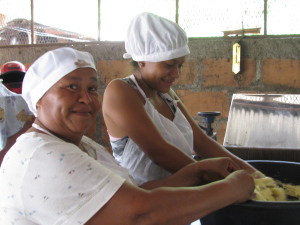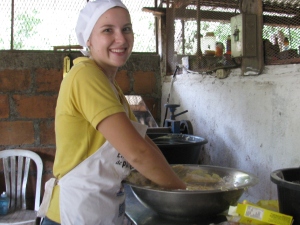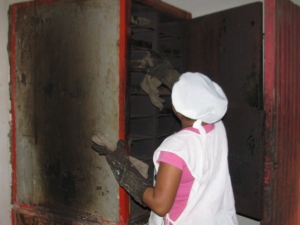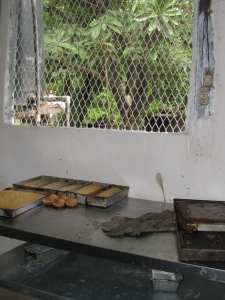 One of my projects over the past few months has been teaching a business administration course at a local NGO, called Chinatlan. Through the course, I met Dona Edvina and her daughter Lesbia. Dona Edvina is basically the quintessential example of an entrepreneur.
One of my projects over the past few months has been teaching a business administration course at a local NGO, called Chinatlan. Through the course, I met Dona Edvina and her daughter Lesbia. Dona Edvina is basically the quintessential example of an entrepreneur.
I always start the class with a riddle and she is the first to come up with the craziest, most out-of-the-box answer.
The first classes riddle: A farmer needs to take a bag of corn, a chicken, and a fox across a river. Luckily, he has a boat. The problem is he can only fit one item at a time in the boat, but if he leaves the fox and the chicken alone together, the fox will eat the chicken. If he leaves the chicken and the corn together, the chicken eats the corn. How can he cross all three items without having anyone eat anyone else?
Dona Edvina’s answer: For me, I’d just throw the fox overboard and tie it to the boat. Foxes know how to swim right? What is this farmer doing with a fox anyways?
I think she actually beat the riddle without giving the correct answer (Hint for those of you trying to figure it out: You can take more than three trips across the river).
Dona Edvina and Lesbia run a bakery in a rural community outside of Chinandega, but they also have found other ways to make an income. Dona Edvina sells vegetables, fresco, and bread in the market. At their house, they have a small store with basic food items and cell-phone minutes. It is clear they are both always thinking of ways to expand their business.
On Saturday, I went to visit the b akery and get a better idea of how I can advise their business. Although we did a little bit of business-y cost and pricing/inventory work, I was really the lucky one because they taught me how to make the tortas they sell. They showed me the industrial, wood burning oven that they use, and basically just made me feel at home in true Nicaraguan style.
akery and get a better idea of how I can advise their business. Although we did a little bit of business-y cost and pricing/inventory work, I was really the lucky one because they taught me how to make the tortas they sell. They showed me the industrial, wood burning oven that they use, and basically just made me feel at home in true Nicaraguan style.
Panaderia Hermanas Ramos or Ram os Sisters Bakery is the type of story you see gracing pamphlets and websites of donor NGO’s working in microfinance all the time. The oldest daughter received training through a government program on how to make and commercialize bread three years ago. The oven was donated two years ago, and has helped Lesbia and her sister to make more bread and expand their business. It has worked, but the door on the lower half of the oven is broken and there has been no follow up from the donor organization, so they can only ever use one half of the oven at a time.
os Sisters Bakery is the type of story you see gracing pamphlets and websites of donor NGO’s working in microfinance all the time. The oldest daughter received training through a government program on how to make and commercialize bread three years ago. The oven was donated two years ago, and has helped Lesbia and her sister to make more bread and expand their business. It has worked, but the door on the lower half of the oven is broken and there has been no follow up from the donor organization, so they can only ever use one half of the oven at a time.
I asked Dona Edvina about this.
“You know how it is,” She told me. “What they (the organization who donated the oven, Semilla Capital) do is just give the oven, and then they leave. I’ve tried to call them but nobody returns my calls.”
It is stories like these that remind me of the case study/horror stories we had to study in all my development courses in college. It is interesting to see “lack of follow-up, lack of organization, misunderstanding of host country cultures” jump out of econ text books. But when it comes down to it, Lesbia can still make more bread than she did before, and the family is still saving money on firewood. So don’t throw in the towel yet, aid programs do work. But they could work better.
We made torta de ojoche (ojoche= some sort of tropical seed), torta de zannahoria (carrot bread), and torta de naranja, (orange bread). “I did my unit costs and I figured out we make way more money selling torta than just simple bread” Dona Edvina told me. “So we focus on that!”
– Jessica, EEP 63
This post was originally posted by Jessica on her personal blog.


This is a great story. Thank you for sharing Jessica. The ojoche bread is pretty cool, also. I think it is one of those super-food grains of the future things.
LikeLike